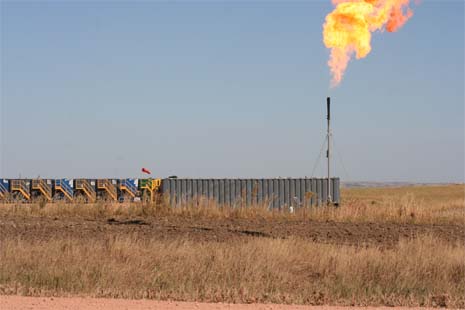WORC and a coalition of health, community, environmental groups are intervening in a lawsuit to defend new methane rules that would prevent the waste of natural resources, save money for taxpayers, and significantly reduce harmful emissions that affect public health and climate.
The Bureau of Land Management’s (BLM) waste prevention standards would cut venting, flaring, and leakage of natural gas on BLM-managed federal and tribal lands. But oil and gas industry groups and three states are contesting these standards in U.S. Federal District Court in Wyoming.
Federal and tribal lands are an important source of oil and gas production. These lands produce five percent of the U.S. oil supply and 11 percent of the U.S. natural gas supply. This production generates more than $2 billion annually in royalties.
Unfortunately, oil and gas companies leasing these federal and tribal lands lose substantial amounts of publicly-owned natural gas through unnecessary venting, flaring, or leaking at production sites. In the WORC region, the lion’s share of the flaring occurs on the Fort Berthold Reservation in North Dakota.
Benefits of the Methane Rules
A recent study from ICF International found that in 2013, drilling on federal and tribal lands—mostly in the rural West—leaked, vented, and flared natural gas worth about $330 million. In addition, an analysis from the Western Values Project estimates taxpayers could lose almost $800 million over the next decade on lost royalties from that gas if oil and gas companies continue their wasteful venting and flaring practices.
Oil and gas companies’ unnecessary venting, flaring, and leakage on federal and tribal lands also poses significant public health and safety risks.The wasted natural gas is primarily composed of methane—a powerful greenhouse gas capable of warming the climate at a rate 84 times that of carbon dioxide over 20 years. The leaked, vented, and flared natural gas also emits carcinogens, such as benzene, and volatile organic compounds—which contribute to hazardous smog that impacts public health.
BLM’s standards require commonsense, inexpensive, and readily available technologies already in use in several states to capture gas that would otherwise be wasted.
The standards yield significant benefits by minimizing the waste of a taxpayer-owned natural resource, and by curbing emissions that contribute to air pollution and climate change, all while helping to create new jobs in the emerging field of methane mitigation. If fully implemented, the rules would save, and put to productive use, up to 56 billion cubic feet of gas a year. That’s enough to supply up to 760,000 households.
These benefits will accrue to millions of people across the country, including those living near oil and gas development on federal and tribal lands.
WORC Member Declaration
WORC member and enrolled member of the Mandan, Hidatsa, and Arikara Nation Lisa DeVille lives on the Fort Berthold Reservation. Within the reservation, there are more 1500 oil and gas wells—many of which leak, vent, and flare methane. The new standards would apply to these oil wells. Lisa described the impact of these wells and the benefits the methane rules would benefit her and her family:
“The flaring has totally changed our way of life. You can see gas flares in every direction you look. They sound like the roaring of jet engines, and they can light up the night sky as bright as day. In September of 2015, my husband, Walter, and I had the opportunity to work with ShaleTest to use a thermal camera to detect emissions from natural gas venting and leaks at a well pad near our house. The emissions were invisible to the naked eye but, through the camera, we saw dark grey clouds streaming off the equipment. We had difficulty breathing, and my husband had a headache and felt nauseous.
“Unfortunately, these emissions are not a violation of existing rules because North Dakota does not currently require companies to monitor and repair leaks like these. The BLM’s rule would reduce flaring further than North Dakota’s rules over time. The rules also prohibit venting of natural gas and require oil and gas companies to monitor for leaks twice a year, which our state and tribal governments do not require. Any leaks must be repaired within 30 days.”
Methane Rules Have Broad Support
BLM’s efforts to reduce natural gas waste have broad support from elected officials and community members across the West. In a recent bipartisan poll of Western states, 80 percent of respondents supported BLM standards to curtail waste of this valuable resource. WORC and its groups have participated in the public process related to this rule for over three years by providing comments on the rules. The final rules are the result of a collaborative and thoughtful process and reflects stakeholder input from groups like WORC.
Industry Arguments In Lawsuit
In contrast to this careful process, industry associations rushed to file legal challenges to overturn the waste prevention rule within 40 minutes after it was released. Forty minutes are obviously not enough time to analyze this rule and determine its impacts.
After our intervention was accepted, industry filed a motion to stop these protections before they become effective. In their motions, these industry associations put forward a number of flawed claims. The most egregious claim was their suggestion that BLM acted unlawfully because its rules may “only” produce additional annual royalty revenues of $22.4 million—a sum the filings characterized as “de minimis,” which means lacking significance or importance.
While $22 million annually may be insignificant for the companies litigating to overturn this rule, it has meaning for infrastructure projects, schools, and communities that stand to benefit from this funding. The good news is that BLM’s commonsense standards are firmly rooted in the agency’s manifest authority to minimize waste.
Two States Intervene to Support Methane Rules
On December 15, California and New Mexico filed to intervene in the lawsuit in favor of the rule. We hope the addition of this support conveys broad support for the methane rules to the court.
The first hearing regarding this case was held in Casper, Wyoming, on January 6.
Read more stories about oil and gas here.
Read more:
WORC Groups Take the Trump Administration to Court Over Gutting BLM Methane Rule
Methane Waste May be Invisible, but its Widespread Impacts Are Not
Members Make Case in Washington DC to Keep Methane Protections


